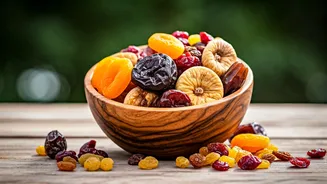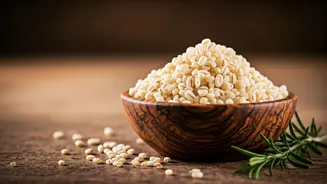The Healthy Allure
Dry fruits, such as almonds, cashews, and dates, are frequently perceived as wholesome snacks, and rightly so. They provide an impressive array of nutrients,
including vitamins, minerals, and fiber, and they’re also a convenient and portable snack option. Their concentrated nature, however, is a double-edged sword. While a small handful can deliver a significant nutrient boost, it's also easy to consume excessive amounts without realizing it. The density of calories and natural sugars in dry fruits means that overeating can quickly undermine your health goals, leading to weight gain and potentially impacting blood sugar levels. Understanding this duality is the first step toward enjoying dry fruits responsibly.
Portion Power Play
The key to enjoying dry fruits lies in portion control, and it's essential for reaping their benefits without the downsides. A recommended serving size is typically around a quarter of a cup, or approximately a handful. This amount can vary slightly depending on the type of dry fruit, but sticking to this general guideline is a safe bet. Using measuring cups or pre-portioning your dry fruits into small containers can be incredibly helpful in preventing overeating. You can also mix dry fruits with other healthy snacks, such as seeds or air-popped popcorn, to increase volume and satisfaction without significantly increasing your calorie intake. Mindful eating, paying attention to your body’s hunger and fullness cues, is crucial, so that you consume the right amount.
Sugar Content Concerns
Dry fruits, even though they contain natural sugars, contribute to a higher concentration of sugars due to the dehydration process. This can be problematic, particularly for individuals managing their blood sugar levels or trying to limit their sugar intake. Dates and figs, in particular, are relatively high in sugar compared to other varieties. It's important to be mindful of this aspect and to choose dry fruits judiciously. While the fiber content in dry fruits helps to slow down the absorption of sugar, moderation is still key. Consider the overall sugar content in your diet and adjust your dry fruit intake accordingly. You can balance this out by consuming dry fruits alongside foods with healthy fats and proteins, as these macronutrients can help regulate blood sugar spikes.
Strategic Snacking Habits
Integrating dry fruits into a balanced eating plan involves strategic choices and mindful habits. Incorporate dry fruits as part of a meal or snack rather than eating them on their own. Pairing them with other foods that offer protein or healthy fats can help to slow down sugar absorption. For instance, a small portion of almonds can be paired with a yogurt. Consider the timing of your dry fruit consumption; they can provide a quick energy boost before a workout, but be mindful of your overall daily calorie intake. Don't let their small size fool you. Evaluate the overall nutrition profile of your diet, making sure dry fruits are part of a larger plan focused on variety and balance.
The Hydration Factor
When eating dry fruits, it's particularly important to stay hydrated. Dry fruits have a low water content, and their concentrated nature can sometimes lead to dehydration if you're not adequately hydrated. Drink plenty of water throughout the day, especially if you're consuming dry fruits as a regular snack. Water is essential for optimal digestion and nutrient absorption. Dehydration can lead to feelings of hunger and fatigue, potentially leading to overeating. Ensure you're drinking enough water alongside your dry fruits to support overall health and well-being. This will help your body effectively process the nutrients and prevent any undesirable effects like constipation.
Mindful Eating Practices
Mindful eating is a cornerstone of a healthy relationship with food, including dry fruits. Pay attention to the flavors, textures, and aromas of the food as you eat it. Avoid distractions such as watching television or working while snacking. Engage your senses, savor each bite, and be aware of your body's signals of fullness. This practice allows you to appreciate the taste and nutritional value of dry fruits without overindulging. Practicing mindful eating can help you make more informed food choices and prevent emotional eating, fostering a healthier overall eating pattern. Incorporate mindful practices into every meal, including snacks, to experience greater satisfaction.





















